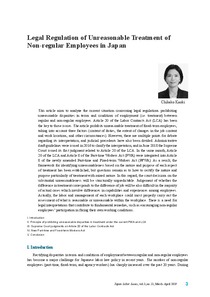Legal regulation of unreasonable treatment of non-regular employees in Japan

2019
3
13
March - April
3-14
working conditions ; equal rights ; labour law ; workers rights ; case law
Human rights
https://www.jil.go.jp/english/jli/index.html
English
Bibliogr.
"This article aims to analyze the current situation concerning legal regulations prohibiting unreasonable disparities in terms and conditions of employment (i.e. treatment) between regular and non-regular employees. Article 20 of the Labor Contracts Act (LCA) has been the key to those issues. The article prohibits unreasonable treatment of fixed-term employees, taking into account three factors (content of duties, the extent of changes in the job content and work locations, and other circumstances). However, there are multiple points for debate regarding its interpretation, and judicial precedents have also been divided. Administrative draft guidelines were issued in 2016 to clarify the interpretation, and in June 2018 the Supreme Court issued its first judgment related to Article 20 of the LCA. In the same month, Article 20 of the LCA and Article 8 of the Part-time Workers Act (PWA) were integrated into Article 8 of the newly amended Part-time and Fixed-term Workers Act (PFWA). As a result, the framework for identifying unreasonableness based on the nature and purpose of each aspect of treatment has been established, but questions remain as to how to certify the nature and purpose particularly of treatment with mixed nature. In this regard, the court decisions on the substantial unreasonableness will be structurally unpredictable. Judgement of whether the difference in treatment corresponds to the difference of job will be also difficult in the majority of actual cases which involve differences in capabilities and experiences among employees. Actually, the labor and management of each workplace could most properly carry out the assessment of what is reasonable or unreasonable within the workplace. There is a need for legal interpretations that contribute to fundamental remedies, such as encouraging non-regular employees' participation in fixing their own working conditions."
Digital;Paper
The ETUI is co-funded by the European Union. Views and opinions expressed are however those of the author(s) only and do not necessarily reflect those of the European Union or the ETUI.